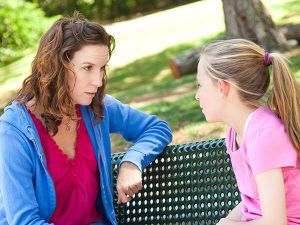About-cancer/coping/adjusting-to-cancer/talk-to-children/zh
與孩子談論您的癌症
即使您的孩子在得知您的癌症時會感到沮喪,也不要假裝一切都好。 甚至很小的孩子也可以感覺到什麼時候出了問題。 他們會看到您感覺不舒服,經常離開家,或者不能像以前那樣花很多時間陪伴他們。 年僅18個月的兒童開始注意到周圍發生的事情。 誠實很重要。 說實話比讓他們想象最壞的情況要好。 給您的孩子一些時間來提問和表達他們的感受。
所有年齡段的孩子都需要知道什麼
關於巨蟹座
- 您的孩子沒有做過,沒有想到或沒有說過致癌的事情。
- 僅因為您患有癌症並不意味着您會死於癌症。 實際上,許多人患癌症的時間很長。
- 您的孩子不能使您康復。 但是他或她有一些方法可以使您感覺更好。
- 科學家正在發現許多治療癌症的新方法。
關於家庭癌症患者
- 您的孩子並不孤單。 其他孩子的父母患有癌症。
- 生氣,生氣或害怕都可以。
- 您的孩子無法採取任何措施來改變您患有癌症的事實。
- 家庭成員可能會因為擔心您而採取不同的行動。
- 無論您發生什麼事情,您都將確保您的孩子得到照顧。
關於他們可以做什麼
- 他們可以通過做一些不錯的事情來幫助您,例如洗碗,打掃房間甚至為您畫畫。
- 他們仍應上學並參加體育運動和其他有趣的活動。
- 他們可以與其他成年人交談,例如老師,家庭成員以及宗教或精神領袖。
患癌症時孩子如何行事
兒童可以多種方式對癌症做出反應。 例如,他們可能:
- Be confused, scared, lonely, or overwhelmed
- Feel guilty and think that something they did or said caused your cancer
- Feel angry when they are asked to be quiet or to do more chores around the house
- Miss the amount of attention they're used to getting
- Regress and behave as they did when they were much younger
- Get into trouble at school or at home
- Be clingy and afraid to leave the house
- Learn what can help children and teens who have a family member with cancer.
Teens
If you have a teenager, know that they're at a time in their lives when they're trying to break away and be independent from their parents. Try to get them to talk about their feelings and ask questions. Tell them as much as they want to know about your cancer. Ask them for their opinions and, if possible, let them help you make decisions.
Teens may want to talk with other people in their lives. Friends can be a great source of support for them, especially those who also have a serious illness in their family. Other family members, teachers, coaches, and spiritual leaders can also help. Encourage your teenage children to talk about their fears and feelings with people they trust.
For more information about support for teens, you may find it helpful to share this e-book When Your Parent Has Cancer: A Guide for Teens with them.
Adult Children
If you have adult children, your relationship with them may change now that you have cancer. You may:
- Ask them to help with making health care decisions, paying bills, or taking care of the house
- Ask them to explain medical information
- Need them to go to the doctor with you or pick up medicines
- Rely on them for emotional support
- Feel awkward when they help with your physical care
For some parents, it may be hard to ask for comfort and care from their grown children. But it's important to talk about cancer with your family members, even if they get upset or worry about you. Try to include them when talking about your treatment. Let them know the choices you would like them to make about your care, in case you're too sick to make the choices yourself. (See Advance Directives.) Recognize that it may be hard for your children to have this talk and that, like you, they're trying to adjust to your illness.
For more details and age-related tips on talking to kids, your family and friends may find it helpful to read the NCI booklet, When Someone You Love Is Being Treated for Cancer.
